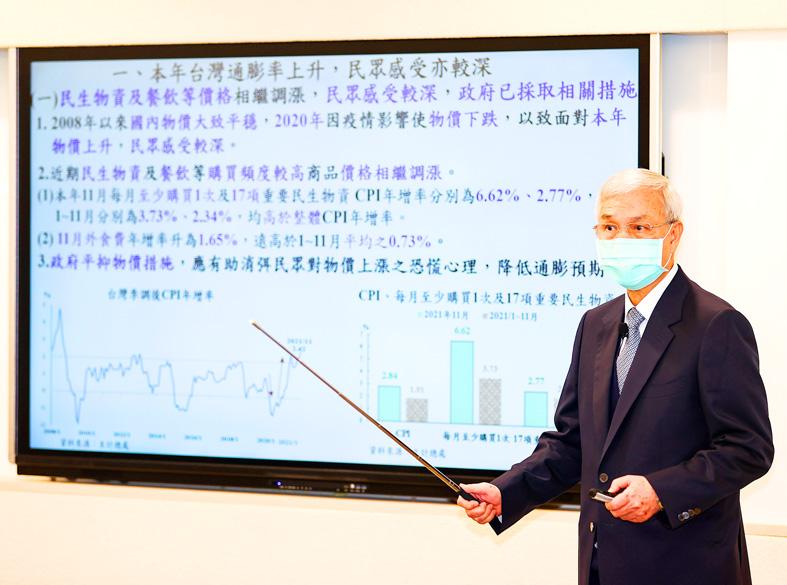The central bank yesterday kept its interest rates unchanged for the seventh consecutive quarter, but tightened lending terms for mortgages for unsold houses, land financing and individuals owning three homes.
The discount and accommodations with collateral rates are to stay at 1.125 and 1.50 percent respectively, while the rate on accommodations without collateral would remain at 3.375 percent, it said.
The monetary policymaker raised its forecast for GDP growth from 5.75 percent to 6.03 percent this year and predicted 4.03 percent growth for next year, but added that an uneven recovery and lingering economic uncertainty warrant a policy hold.

Photo: CNA
“The robust economic performance does not extend to domestic service sectors, and small and medium-sized enterprises,” central bank Governor Yang Chin-long (楊金龍) told a media briefing in Taipei after the bank’s quarterly board meeting.
If the sectors also recover and inflation deteriorates, the central bank would increase interest rates by 25 basis points to the levels before the COVID-19 pandemic began early last year, Yang said.
Yang cautioned property owners, especially young first-home buyers, to avoid overleveraging, as the central bank would move toward monetary normalization next year.
Taiwan’s inflationary pressures are transient in nature, Yang said, pointing at low comparison bases last year.
“Taiwan has balanced supply and demand for most products, unlike the US, where port congestion has caused supply chain disruptions and pushed up consumer prices,” Yang said.
The inflation rate would ease to 1.59 percent next year, from an estimated 1.97 percent this year, Yang said.
However, housing prices would continue to increase amid developers’ upbeat sentiment, excess global liquidity and companies returning from abroad, Yang said.
To facilitate a soft landing, the central bank would, effective today, lower the loan-to-value (LTV) ratio for third-home mortgages by individuals from 55 percent to 40 percent, Yang said.
The LTV ratio for unsold houses would drop from 50 percent to 40 percent, while the land financing LTV ratio would fall from 60 percent to 50 percent, with 10 percent to be withheld until the start of construction, he said.
Land loan borrowers would also need to sign a document containing the details of and schedule for the planned development, Yang said, adding that he is planning to discuss standard terms with lenders to create a level playing field.
The past two rounds of credit controls aimed to prevent funds from overflowing to the property market, rather than to reverse property prices, Yang said.
“They will prove helpful in the long run,” he said.
Andy Huang (黃舒衛), a researcher at property consultancy Knight Frank Taiwan, said that the latest credit controls would weigh on property investors who have to produce more capital and wait longer to generate a profit.
If coupled with the Ministry of the Interior’s plan to set up stricter requirements on presale project transfers, investors would flee the market, Huang said.

CHIP WAR: Tariffs on Taiwanese chips would prompt companies to move their factories, but not necessarily to the US, unleashing a ‘global cross-sector tariff war’ US President Donald Trump would “shoot himself in the foot” if he follows through on his recent pledge to impose higher tariffs on Taiwanese and other foreign semiconductors entering the US, analysts said. Trump’s plans to raise tariffs on chips manufactured in Taiwan to as high as 100 percent would backfire, macroeconomist Henry Wu (吳嘉隆) said. He would “shoot himself in the foot,” Wu said on Saturday, as such economic measures would lead Taiwanese chip suppliers to pass on additional costs to their US clients and consumers, and ultimately cause another wave of inflation. Trump has claimed that Taiwan took up to

A start-up in Mexico is trying to help get a handle on one coastal city’s plastic waste problem by converting it into gasoline, diesel and other fuels. With less than 10 percent of the world’s plastics being recycled, Petgas’ idea is that rather than letting discarded plastic become waste, it can become productive again as fuel. Petgas developed a machine in the port city of Boca del Rio that uses pyrolysis, a thermodynamic process that heats plastics in the absence of oxygen, breaking it down to produce gasoline, diesel, kerosene, paraffin and coke. Petgas chief technology officer Carlos Parraguirre Diaz said that in

SUPPORT: The government said it would help firms deal with supply disruptions, after Trump signed orders imposing tariffs of 25 percent on imports from Canada and Mexico The government pledged to help companies with operations in Mexico, such as iPhone assembler Hon Hai Precision Industry Co (鴻海精密), also known as Foxconn Technology Group (富士康科技集團), shift production lines and investment if needed to deal with higher US tariffs. The Ministry of Economic Affairs yesterday announced measures to help local firms cope with the US tariff increases on Canada, Mexico, China and other potential areas. The ministry said that it would establish an investment and trade service center in the US to help Taiwanese firms assess the investment environment in different US states, plan supply chain relocation strategies and

Japan intends to closely monitor the impact on its currency of US President Donald Trump’s new tariffs and is worried about the international fallout from the trade imposts, Japanese Minister of Finance Katsunobu Kato said. “We need to carefully see how the exchange rate and other factors will be affected and what form US monetary policy will take in the future,” Kato said yesterday in an interview with Fuji Television. Japan is very concerned about how the tariffs might impact the global economy, he added. Kato spoke as nations and firms brace for potential repercussions after Trump unleashed the first salvo of